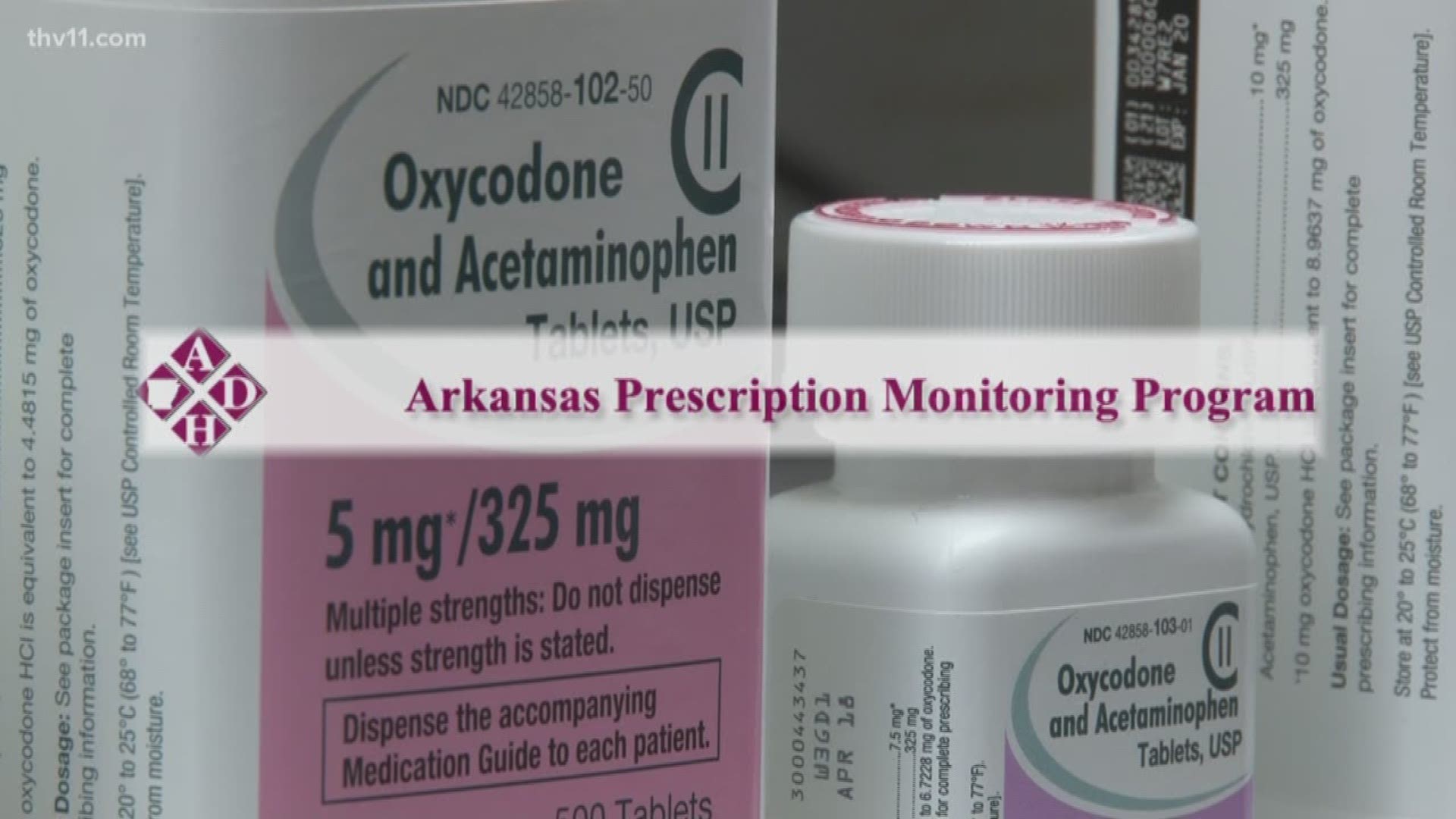LITTLE ROCK, Ark. (KTHV) - Drug overdoses have become the leading cause of death for Americans under 50, according to the CDC, who reports opioids account for about 80 percent of those deaths.
In April of 2017, Gov. Asa Hutchinson signed Arkansas Act 820 into law, which requires opioid prescribers to check the Prescription Drug Monitoring Program (PDMP) every time they prescribe the medication. This is to help avoid doctor shopping and overprescribing. However, THV11's Winnie Wright uncovered that some prescribers aren't using the PDMP.
Despite being required by law, the Arkansas Department of Health's 2017 annual PDMP report showed that 22 percent of opioid prescribers in Arkansas are not registered with the program.
"It's just a disregard for the law,” said State Rep. Kim Hammer, who also sponsored the bill. "The law was intended to make everybody accountable. If you're in the chain of administering controlled substances, you do your part."
Now that it's law, prescribers are required to check the PDMP before writing opioid prescriptions, and pharmacists are required to report any opioid prescriptions that are filled.
"I think for one word, I'm disappointed,” Arkansas State Drug Director Kirk Lane said. A big part of his job has been tackling the opioid epidemic crippling the state.
"I'm disappointed because we worked hard to pass this law. The intent of this law wasn't to limit prescribing, but was to give good information to a prescriber to make a good prescribing decision,” he said.
Arkansas has the second-highest opioid prescribing rate in the country. Hammer said, if the check isn't happening, patients in Arkansas can still doctor shop.
"The intent was that each one of them would check the PDMP. That way they could see and identify if somebody's trying to work the system and get a controlled substance,” Hammer said.
The state has five boards (medical, pharmacy, dental, nursing and veterinary) that have access to opioids, all of which are required to use the PDMP. Lawmakers intentionally cast a wide net of boards.
"Maybe they're going to the veterinary clinic and they're getting a prescription for their pet, when in reality they're going to use it for themselves,” Hammer went on to say.
Each board was required to present before the Arkansas Legislative Council on July 3. In those presentations, they were expected to explain how their members have utilized the PDMP and how they're working to bring the prescribing rate down. According to the information presented to the ALC, the pharmacy board is the only one that has issued disciplinary action against those who don't properly access the PDMP.
"I've outlined two different cases we've had of pharmacies or pharmacists failing to submit those reports. Both of those pharmacists are unable to practice at this time,” said Arkansas Board of Pharmacy Director John Kirtley. "Shame on them. This is about dealing with unprofessional conduct and violations of state law."
For instance, the nursing board "encourages" those found to be misusing scheduled prescriptions to seek treatment, but they have no disciplinary matrix in writing that says "If you do this, this will happen." For example, if the person weren't using the drugs for themselves, but maybe selling them.
The Arkansas Department of Health is required to issue report cards to prescribers, letting them know how they're doing when it comes to overprescribing and using the PDMP system. According to the medical board, they will not receive copies of the report cards unless provided by the physician.
If there are concerns about prescribing habits, and there's been no response from doctors, the board will then get a copy. The earliest that could happen is spring of 2019.
However, the Arkansas Department of Health told me they are able to communicate some concerns about provider prescribing outside of the report cards.
"If the system we have needs improvements to give them accurate, real-time information. That's where our emphasis needs to be, to make sure the system is as flawless as possible. That way failure rests on the part of each person who didn't do their job,” Hammer said.
Last year, there were 185 prescriptions per 100 people in parts of Arkansas. That's enough for each person to have their own bottle of pills.
Lane says education is a big piece of the puzzle. With more education, prescribers would understand why and how prescribing numbers should be brought down. However, based on the presentations, few boards have new, if any, education in place regarding the prescribing of opioids and the PDMP.
"I think they need to address it and they need to mandate it, as requirements under part of their rules,” Lane said. “Arkansas Medical Board has recently a 20-hour requirement, but only one hour for prescribing education when it comes to opioids. In my personal view, that needs to be increased. Especially in the midst of the epidemic we have."
However, Hammer said if the boards don't begin disciplining members and there isn't 100 percent buy-in, he's not opposed to taking the issue before the legislature so they can determine a proper punishment.
"What we are having to deal with is a generation that has done it this way for years, and change is hard. But when you're number two in the nation, or close to the top, as-far-as being recognized as a state that has the biggest problem with opioids, I think that demands change and individuals have to come around,” he said. "Make an example of a few and everyone else is going to get the message."
One of the excuses the Medical Board offered for the underreporting was that staff wasn't properly checking the PDMP.
ADH reports that since the PDMP was implemented, they've been able to make a huge dent in doctor shopping. Since mid-2015, the number of patients found to be doctor shopping has fallen from 37 to two.

